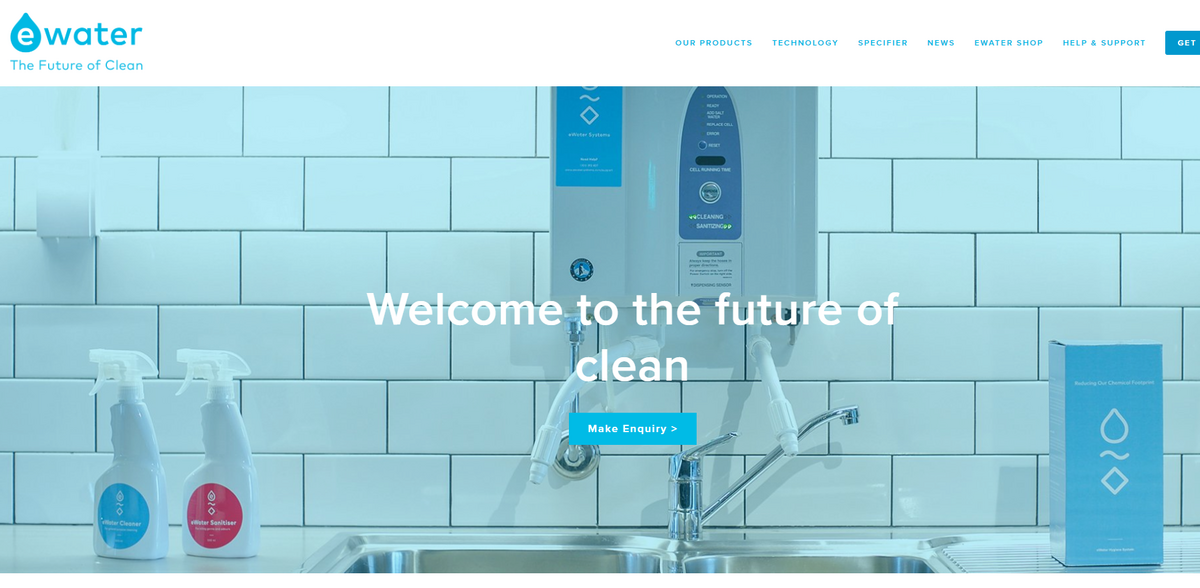What is the eWater Project?
THE FUTURE OF CLEAN… Introducing an on-site generation system that offers disruptive, circular technology for a cleaner, safer world. eWater is a sophisticated solution developed in the Chemicals & Chemical Products industry, promising innovation that radically redefines food safety, infection control, green chemistry, and sustainable cleaning practices. This project delivers a scientifically proven alternative that replaces traditional harsh chemicals with electrolysed water. It offers a modern approach to safety and hygiene, ensuring a cleaner future while being cost effective. Designed with applications in food service and workplace cleaning, the eWater system is tailored for various settings—from general surface cleaning to food contact sanitisation. A true testament to cutting-edge biodegradable biotechnology and organic practices, it is backed by a certified B Corporation status and an impressive B Corp score of 97.3.
Main Benefits of eWater
The innovative system brings a number of advantages that are hard to ignore. Below are the key figures and benefits that illustrate what sets this project apart:
- Cost Efficiency: Produces water at just $0.0035 per litre, bypassing the need for expensive chemical refills.
- Reduction in Waste: Eliminates single-use plastics and synthetic chemical waste, aligning with circular economy principles.
- Enhanced Safety: The on-site generated solution is non-toxic and significantly safer for teams by eliminating harsh chemical exposure.
- Proven Performance: Delivers hospital-grade disinfection and food-safe sanitation, meeting HACCP and regulatory standards.
- Environmentally Responsible: Enhances green building standards and contributes to a sustainable future.
Circular Economy and Sustainability
CLEANER, SMARTER, CIRCULAR… eWater isn’t just about efficiently cleaning surfaces; the project firmly supports a circular economy approach by reducing synthetic chemicals and single-use plastics. As a certified B Corporation, the project integrates sustainability into every facet of its operations. The commitment to robust environmental practices means that the technology not only improves immediate cleaning standards but also contributes to long-term ecological health. It is rooted in green chemistry and organic methods that support food safety while being remarkably cost effective. The sustainability credentials act as a promise for a cleaner planet and prioritise responsible production methods that benefit both businesses and communities.
Safe and Sustainable Cleaning Applications
EFFECTIVE SUSTAINABLE CLEANING is at the heart of this initiative. eWater offers versatile solutions for a spectrum of cleaning needs. The project caters to general surface cleaning; TGA hospital grade disinfection; bathroom cleaning and deodorising; floor scrubbing—as the solution is fully compatible with scrubbers; and streak-free cleaning for glass and stainless steel. When it comes to waste management, the technology even addresses bin and drain deodorising. Additionally, specialized applications designed for food safety include cleaning and sanitising food contact surfaces, washing fresh produce to reduce spoilage, and managing kitchen and front-of-house hygiene. All of these uses work together to support stringent food safety and infection control standards, making it a preferred choice in both food service and workplace environments.
Innovative Technology and Industry Leadership
At the core of this project lies advanced on-site generation technology that is both innovative and scientifically verified. The eWater solution disrupts traditional chemical-based cleaning by producing electrolysed water that is effective across various applications. The technology streamlines cleaning operations by reducing operating expenses and eliminates the disposal challenges associated with chemical refills. Businesses that implement this system have observed significant improvements in both safety standards and compliance with regulatory mandates. It’s a bold move in biotechnology that showcases how disruptive technology can be successfully merged with sustainability goals. Such leadership in the field of cleaning has spurred interest from industries looking to embrace more ethical and eco-friendly approaches.
The Impact on Sustainability and SDGs
- SDG 3 – Good Health and Well-Being
- SDG 6 – Clean Water and Sanitation
- SDG 7 – Affordable and Clean Energy
- SDG 9 – Industry, Innovation, and Infrastructure
- SDG 12 – Responsible Consumption and Production
Future Goals and Industry Commitment
OUR MISSION shines through every aspect of the project, aiming to reduce global dependency on harsh chemical consumables by providing innovative cleaning solutions that are both safe and sustainable. By achieving significant cost efficiencies and dramatically reducing plastic and chemical waste, eWater has already replaced millions of litres of synthetic chemicals over its operational lifetime. The project underlines its commitment to protecting people, the planet, and the businesses that use its technology. With a focus on improving workplace safety and advancing sustainable practices, eWater sets a new benchmark for the industry. Its mission is simple yet powerful—a commitment to smarter hygiene, reduced waste, and a cleaner future that resonates with the core values of sustainability, innovation, and circular economy. In today’s fast-evolving world, such groundbreaking advancements in green chemistry speak volumes about what the future of cleaning holds.


















